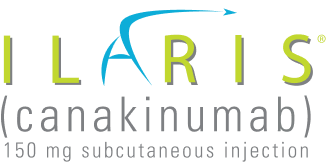
Safety
Not an actual patient. Individual results will vary.
Safety profile of ILARIS from FMF, HIDS/MKD, and TRAPS clinical trials
| Most Common Adverse Drug Reactions (≥3%) in Patients Treated With ILARIS1 | |
| Injection site reaction | 10.1% |
| Infections, including nasopharyngitis | 10.7% |
| Upper respiratory tract infection | 7.1% |
| Rhinitis | 5.3% |
| Gastroenteritis | 3.0% |
| Pharyngitis | 3.0% |
- The most common adverse reactions (≥10%) were injection site reactions and nasopharyngitis1
- Serious infections (eg, conjunctivitis, pneumonia, pharyngitis, pharyngotonsillitis) were observed in approximately 2.4% (0.03 per 100 patient-days) of patients receiving ILARIS1
No new or unexpected safety findings of ILARIS emerged in the PFS clinical trial1,2
Among all 3 patient cohorts in the ILARIS group:
- No deaths were reported
- No anti-canakinumab antibodies were detected in any patient
- Few patients discontinued treatment due to AEs:
- FMF: 0 patients
- HIDS/MKD: 2 patients
- TRAPS: 1 patient
FMF, HIDS/MKD, and TRAPS Safety Population1
In Part 2, 90 patients were initially randomized to ILARIS 150 mg and 91 patients were randomized to placebo every 4 weeks1:
- ILARIS group: 55.6% of patients remained on the initial dose through Week 16, with 6.7% receiving an additional ILARIS dose between Day 7 and Day 15
- Placebo group: 9.9% of patients remained on placebo through Week 16, with 28.6% switching to ILARIS treatment by Day 15
Overall, there were 58 patients with FMF, 68 patients with HIDS/MKD, and 43 patients with TRAPS in the safety set with a cumulative exposure of 47.61 patient-years. The cumulative exposure in the placebo group was 8.03 patient-years.1
Safety profile of ILARIS from CAPS clinical trials
| Most Common Adverse Drug Reactions (≥10%) in Patients Treated With ILARIS1 | |
| Preferred term | ILARIS (N=35), n (%) |
| Number of patients with AEs | 35 (100)
|
| Nasopharyngitis | 12 (34) |
| Diarrhea | 7 (20) |
| Influenza | 6 (17) |
| Rhinitis | 6 (17) |
| Nausea | 5 (14) |
| Headache | 5 (14) |
| Bronchitis | 4 (11) |
| Gastroenteritis | 4 (11) |
| Pharyngitis | 4 (11) |
| Weight increased | 4 (11) |
| Musculoskeletal pain | 4 (11) |
| Vertigo | 4 (11) |
A total of 9 serious adverse reactions were reported with ILARIS in CAPS clinical trials, including infections and vertigo1*
- 1 patient discontinued treatment due to potential infection
9% of patients experienced injection site reactions in Part 11
- Injection site reactions occurred in 1 patient in each arm (7%) of Part 2 and in 1 patient in Part 3
- No severe injection site reactions were reported
Infections, predominantly of the upper respiratory tract, in some instances serious, were reported with ILARIS1
- Generally, the observed infections responded to standard therapy
- Isolated cases of unusual or opportunistic infections (eg, aspergillosis, atypical mycobacterial infections, cytomegalovirus, herpes zoster) were reported during ILARIS treatment. A causal relationship of ILARIS to these events cannot be excluded
References: 1. Ilaris. Prescribing information. Novartis Pharmaceuticals Corp. 2. Data on file. CACZ885N2301 FMF, HIDS/MKD, and TRAPS Clinical Study Report.
Novartis Pharmaceuticals Corp; 2016.
